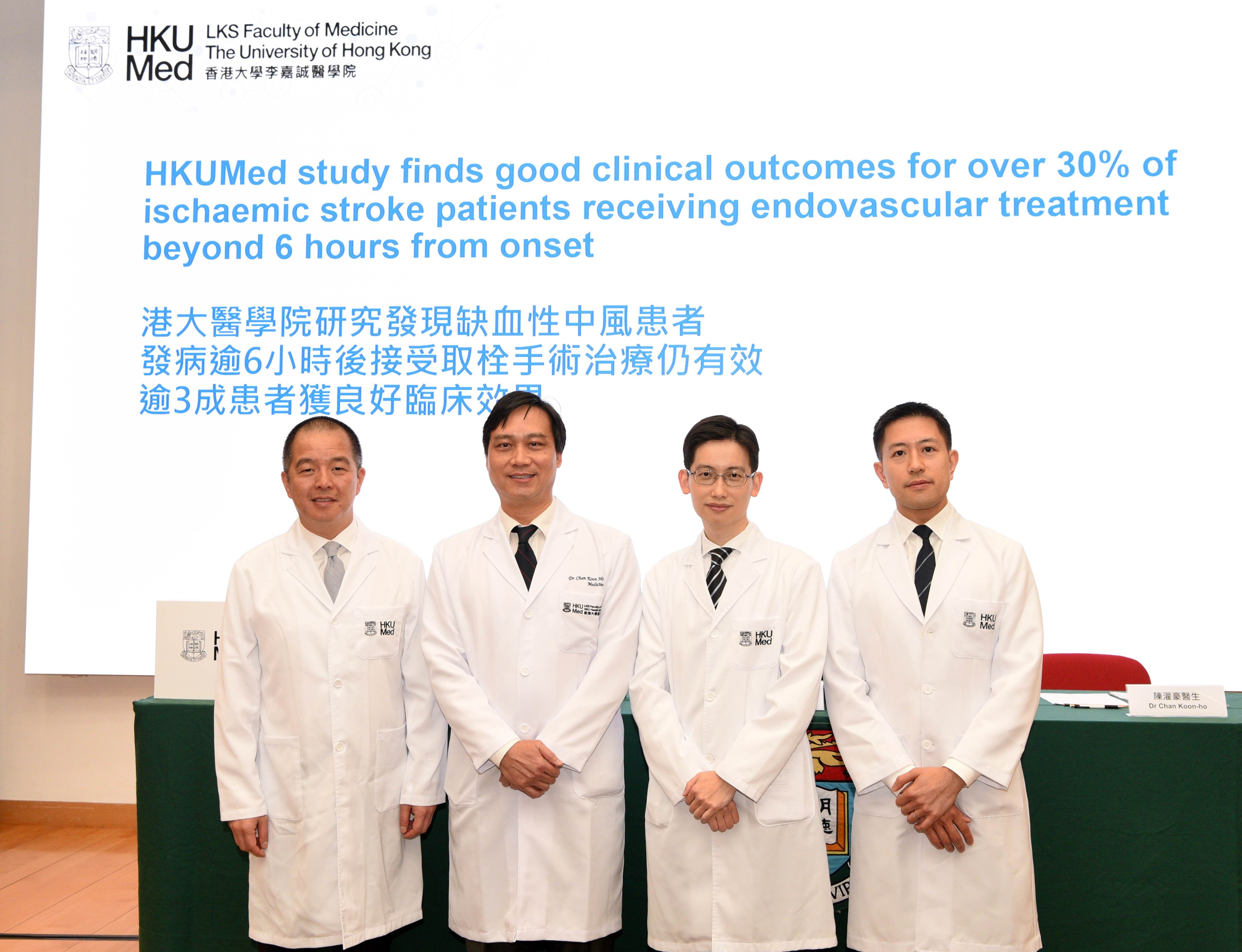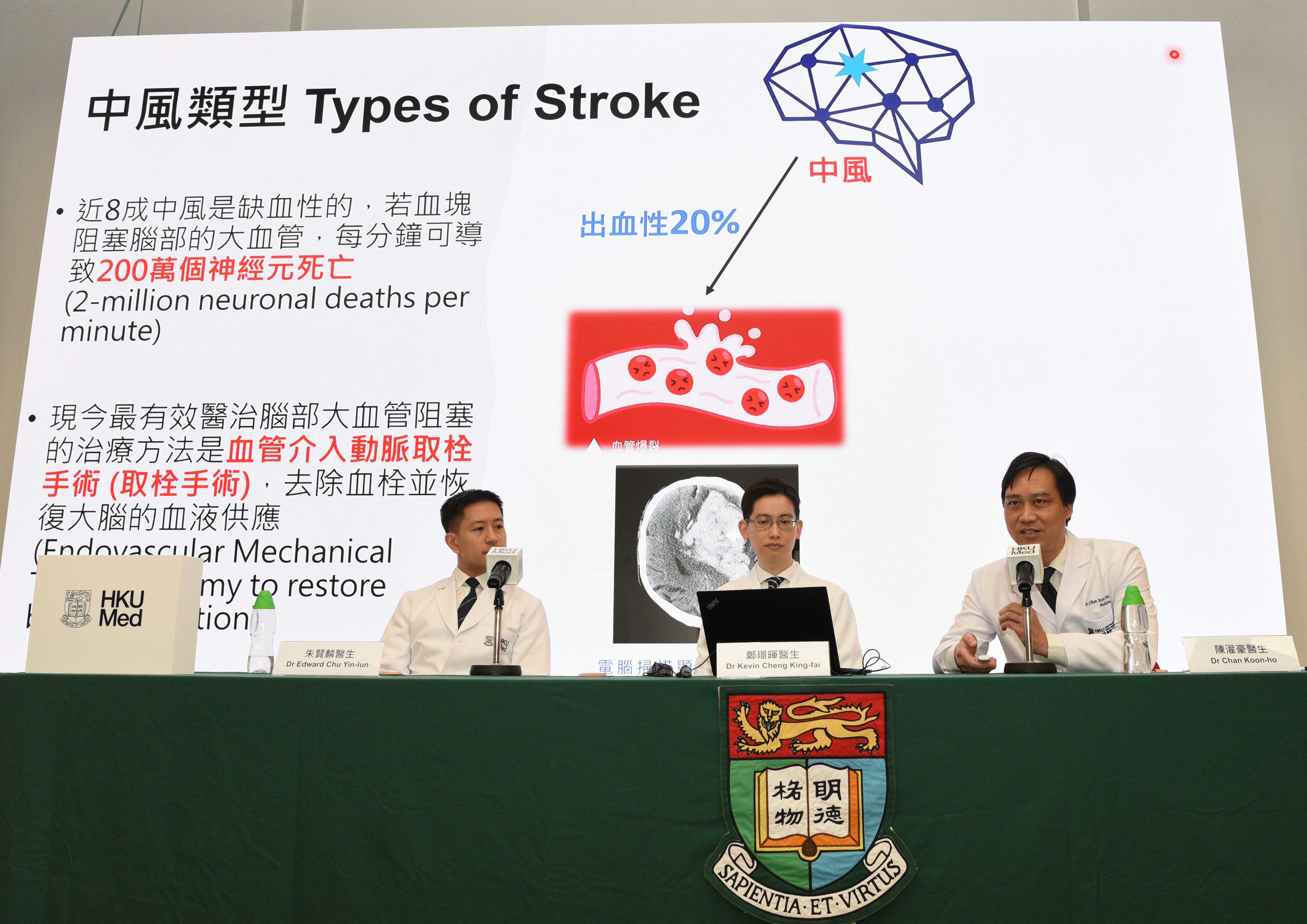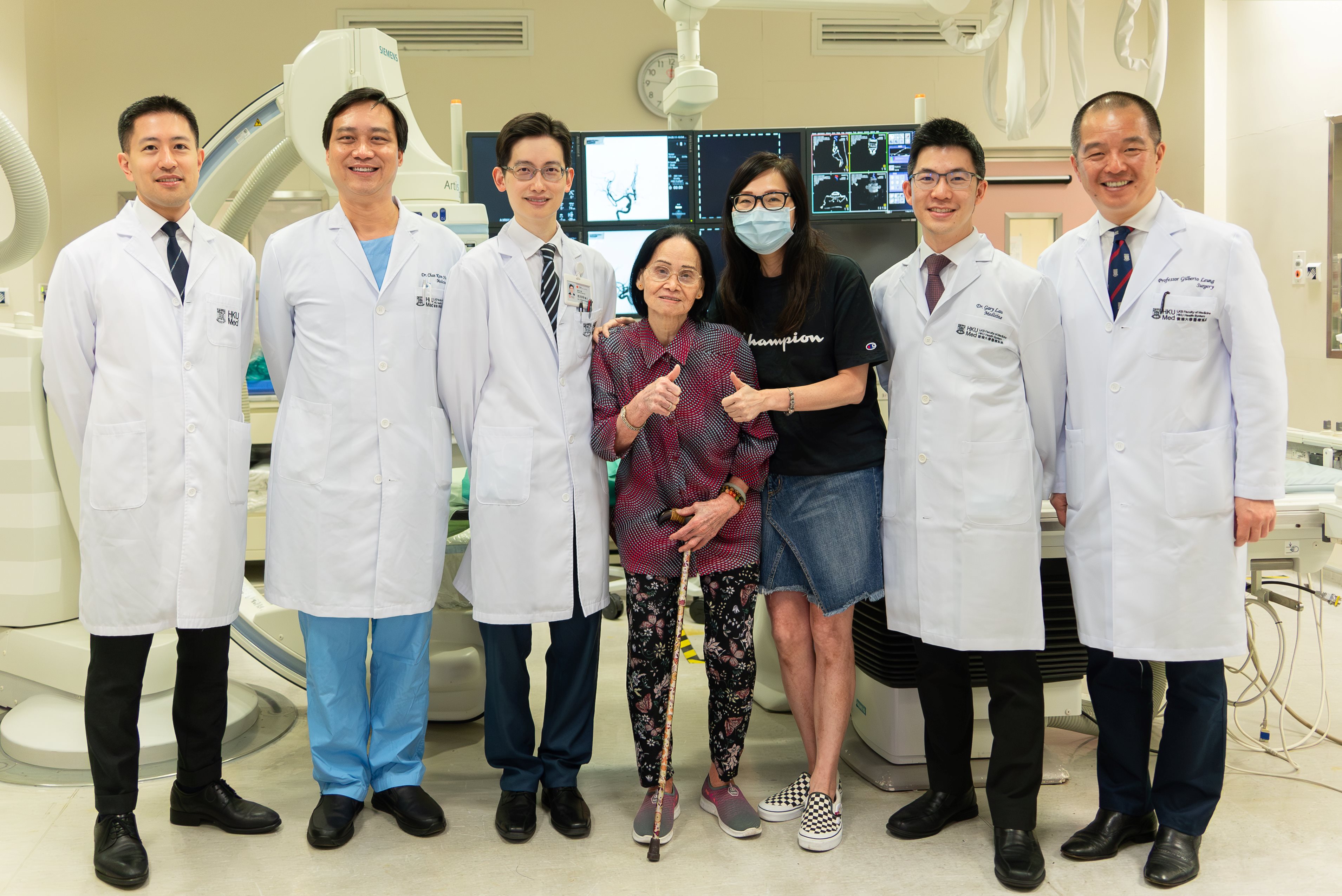14 May 2024
Download Presentation Slides and a Patient Sharing Video
Endovascular treatment for acute ischaemic stroke patients beyond six hours from onset is still effective, according to a collaborative study conducted by the LKS Faculty of Medicine at the University of Hong Kong (HKUMed) and Queen Mary Hospital (QMH). The study, conducted over five years, found that over 30% of patients who received endovascular treatment had a good clinical outcome even after six hours of the onset of symptoms. Ischaemic stroke, a leading cause of death and disability in Hong Kong and worldwide, requires rapid and timely treatment to minimise patient harm.
In collaboration with neurologists, radiologists and neurosurgeons from HKUMed and QMH, the dedicated team has pioneered the first 24/7 intra-arterial mechanical thrombectomy for stroke in the territory since 2018. They also closely monitored the outcomes of this treatment. Over the period, more than 400 patients were treated, 13% of whom were treated six hours or more after the onset of symptoms. The study underscores the significance of ongoing research and advances in stroke treatment to improve patient outcomes and reduce the burden of this debilitating condition.
Background
Acute ischaemic stroke is commonly caused by the blockage of an artery supplying the brain. When a blood clot obstructs the blood stream in the artery, it cuts off the blood supply, resulting in a lack of oxygen and nutrients to brain cells. Timely intervention is crucial, as brain cells begin to die rapidly during this critical phase, leading to the loss of brain function, paralysis, speech impairment and even death.
Standard treatments aim to restore blood flow to the brain by dissolving or removing the blood clot causing the blockage. Two primary methods are employed for treating ischaemic stroke. The first method involves administering an intravenous thrombolytic agent, a drug effective for small artery strokes, within 4.5 hours of symptom onset to dissolve the blood clot. The second, known as intra-arterial mechanical thrombectomy, uses a catheter to remove the blood clot within six hours of symptom onset. This is the standard treatment for strokes caused by blockages in larger arteries. Previous international studies show that 32.6% of patients who received a mechanical thrombectomy within six hours of symptom onset could achieve functional independence, compared to only 19.1% without this treatment.
Research findings and significance
The study, conducted at QMH, the first hospital in Hong Kong to provide round-the-clock intra-arterial mechanical thrombectomy, showed promising results in treating stroke patients within the critical six-hour window. The findings indicate that 43.5% of the patients attained positive clinical outcomes, comparable to international standards (32.6%). Notably, the study also revealed that among patients who had experienced a stroke for more than six hours, a subset of individuals were identified by doctors as eligible candidates for mechanical thrombectomy after clinical assessment and brain imaging. The study findings demonstrated a significant success rate, with 36% of these patients achieving functional independence 90 days after surgery.
'Time is critical in stroke treatment, as it is directly correlated with the survival of brain cells,' said Dr Kevin Cheng King-fai, Honorary Clinical Associate Professor, Department of Surgery, School of Clinical Medicine, HKUMed. 'Although the effectiveness of mechanical thrombectomy is not on par with treatment within the six-hour mark, this study showed that over 30% of patients who underwent the procedure beyond the golden period after careful evaluation and screening by doctors experienced significant improvement.'
Dr Edward Chu Yin-lun, Honorary Clinical Assistant Professor, Department of Diagnostic Radiology, School of Clinical Medicine, HKUMed, highlighted, 'With advances in imaging technology, we can now more accurately identify suitable patients for endovascular treatment, extending the golden period for stroke treatment from six hours to 24 hours, ultimately benefiting a larger number of patients.'
By demonstrating the positive outcomes achievable through timely intervention, Dr Cheng added that the provision of 24/7 mechanical thrombectomy service at QMH has paved the way for improved stroke care in Hong Kong, providing patients with an extended opportunity for recovery and improved quality of life.
To achieve better outcomes, Dr Chan Koon-ho, Clinical Associate Professor, Department of Medicine, School of Clinical Medicine, HKUMed, emphasised the importance of early detection of stroke, along with a pre-hospital ambulance notification system to ensure that stroke patients are promptly directed to a stroke service centre to maximise their chance of a positive treatment outcome.
About the Research Team
This intradisciplinary study from the School of Clinical Medicine at HKUMed was led by Dr Kevin Cheng King-fai, Honorary Clinical Associate Professor, Department of Surgery; Professor Gilberto Leung Ka-kit, Associate Dean (Teaching and Learning), and Tsang Wing-Hing Professor in Clinical Neuroscience Clinical Professor, Department of Surgery; Dr Chan Koon-ho, Clinical Associate Professor, Department of Medicine; Dr Gary Lau Kui-kai, Clinical Associate Professor, Department of Medicine, and Director of HKU Stroke; Dr Mona Tse Man-yu, Honorary Clinical Associate Professor, Department of Medicine; and Dr Edward Chu Yin-lun, Honorary Clinical Assistant Professor, Department of Diagnostic Radiology. Other members included Dr Benjamin Lo Wai-yue, Associate Consultant, Department of Neurosurgery, QMH; and Olivia Choi Ming-yan, Honorary Research Associate, Department of Surgery, School of Clinical Medicine, HKUMed.
Hotline for the 24/7 mechanical thrombectomy service at QMH: 7083-5207
Media enquiries
Please contact LKS Faculty of Medicine of The University of Hong Kong by email (medmedia@hku.hk).




Follow HKUMed